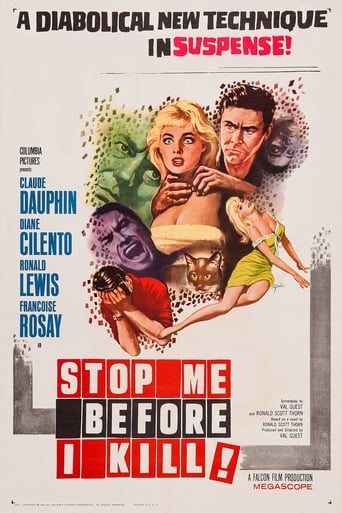Scott LeBrun
At 108 minutes, the Hammer production "Stop Me Before I Kill!" is one of the longest movies that they made. It's a rather meaty story, and serves as a major showcase for three of its main actors, but isn't that satisfying overall. Written by producer & director Val Guest and author Ronald Scott Thorn, based on the latters' novel "The Full Treatment", it tells of a British race car driver, Alan Colby (Ronald Lewis), and his lovely Italian wife Denise (Diane Cilento), vacationing in France some time after a bad traffic accident in which the other driver had died. Alan fears for his sanity, and is now worried that he may have developed homicidal intentions towards his wife. They make the acquaintance of an eminent French psychiatrist, David Prade (Claude Dauphin), who attempts to help Alan deal with his issues.This could and should have been a little more involving, as the premise is not bad and it's entertaining enough in watching psychiatric methods being employed. But the script by Guest and Thorn is so heavily laden with dialogue that it barely gives the story (not to mention the actors) a chance to breathe. It does have some good dialogue, and starts to go for more interesting visuals in its final third. The on location shooting, of course, is impeccable, which, along with the Megascope photography, helps to make the picture pleasant enough to look at. (To say nothing of sexy blonde Cilento). Dauphin, Cilento, and Lewis are all fine, and they're ably supported by Francoise Rosay as Prades' mother, and Bernard Braden as Colby's friend Harry. The filmmaking is pretty slick; it's just too bad that the scenario can't generate more suspense.Certainly worth a look for devoted Hammer followers, but not one of their best.Six out of 10.
blanche-2
"Stop Me Before I Kill" or "The Full Treatment" is a 1960 film with a screenplay by Val Guest, who also directed.The story concerns a famous race car driver, Alan Colby (Ronald Lewis), who was involved in a terrible car crash with his wife Denise (Diane Cilento). He is unable to race, and he and Denise go to the south of France on vacation.Alan goes through swift mood shifts - the slightest word can set off his temper. And he keeps being tempted to strangle his wife - in fact, he nearly does a couple of times. This, of course, is where one has to suspend belief because why the heck would she stay with someone who has attempted to strangle her and whose temper flares at the drop of a hat? I understand women in abusive situations, but I don't know, my husband trying to kill me takes it to a new level.A psychiatrist they meet, Dr. David Prade (Claude Dauphin) offers to help. Alan is hesitant, but once back in London, where Prade has also returned, he agrees. At the end of the treatment, he feels that he is cured. He is able to get back on the racing track and has no temptation to hurt Denise.Right before he is to leave for a race, Alan wakes up and finds that Denise is not there. In fact, all the evidence points to the fact that she has been murdered. This was a very good story that suffered from an unbalanced script. The film went on too long, and the psychiatric scenes were endless. Diane Cilento is a beautiful and heartfelt Denise, Claude Dauphin is likable, and Ronald Lewis for me lacked subtlety in a difficult role. A good-looking man, in the beginning of the film, he reminded me of David Hasselhoff; fortunately, the resemblance faded somewhat.Sadly Ronald Lewis committed suicide in 1982, bankrupt and his career in the doldrums.In other hands and a bigger budget, this could have been an excellent film. However it's worth seeing for the story.
moonspinner55
Psychological thriller from producer-director Val Guest could perhaps use more thrills and less psychology. Racecar driver fights against getting psychiatric help after a road accident--which killed the other driver--has left him badly shaken; his spouse begs him to reconsider, particularly after she becomes the target of her husband's subconscious rage. Adaptation of Ronald Scott Thorn's novel "The Full Treatment" (the movie's alternate title), by Thorn and Guest, has some tart dialogue and solid performances, and looks great as photographed by Gilbert Taylor, but the midsection of the film is redundant. Guest turns the plot-screws with careful deliberation, but is too slow in getting this web untangled. **1/2 from ****
Woodyanders
Brusque, high-strung, and short-tempered race car driver Alan Colby (a solid and credible performance) is trying to recover from a serious head injury. Alan and his loyal wife Denise (winningly played by the sultry Diane Cilento) go on vacation to the South of France for some much needed rest and relaxation. But Alan is having trouble resisting his more violent impulses. Suave local psychiatrist David Prade (a smooth portrayal by Claude Dauphin) offers to help Alan out. Director Val Guest, who also co-wrote the overly talky script with Ronald Scott Thorn, unfortunately allows the uneventful story to plod along at a very slow pace and fails to generate much in the way of either tension or excitement. The key problem with this film is that nothing much happens; it's basically just a handful of people yakking up a storm for an overlong hour and forty-eight minutes. The capable cast do their best with the bland material, but their competent acting can't completely alleviate the general tedium. Moreover, the pretty obvious and predictable conclusion fails to deliver the goods as well. On the plus side, both the lovely Cilento and the French scenery look absolutely gorgeous while Gilbert Taylor's sharp black and white widescreen cinematography and Stanley Black's swinging jazzy score are up to speed. Passable, but overall a really blah and unmemorable picture.




